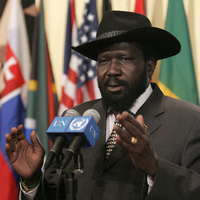JUBA, Sudan -- Growing fears over Southern Sudan's approaching referendum on self-determination have ratcheted up the stakes of Friday's summit between U.N. Secretary-General Ban Ki-Moon, U.S. President Barack Obama and high-level representatives of Sudan. Secretary of State Hillary Clinton recently referred to the situation as a "ticking time bomb," and statements this week from various officials on the sidelines of the U.N. General Assembly in New York have further contributed to the bleak international outlook.
Preparations for the referendum vote are badly lagging, as are negotiations between Khartoum and Juba over post-referendum arrangements. Meanwhile, trust between the North and South has approached an all-time low since the end of the country's civil war, while militarization along the shared border indicates preparations for the worst.
In part due to the efforts of American advocacy groups, the U.S. has stepped up its diplomatic and operational presence in Southern Sudan ahead of the scheduled January referendum -- part of a so-called "Juba surge" announced by Obama's special envoy to Sudan, Maj. Gen. Scott Gration, back in April. The higher-level, intensified engagement by the Obama administration has been welcomed by advocates and experts in Washington and other capitals, who see it as a necessary step to replicate the "Naivaisha Process" that yielded the signing of the 2005 Comprehensive Peace Agreement between Juba and Khartoum. That agreement, one of the crowning foreign policy achievements of the Bush presidency, brought an end to the country's 20-year-long civil war.

